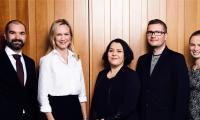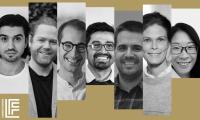50 million Danish kroner awarded to five new Lundbeckfonden fellows

Each year, Lundbeckfonden allocates around 10% of its grants to fellowships for some of the most talented scientists at Danish universities and research institutions. Consequently, they constitute a significant proportion of the foundation’s contribution to biomedical sciences research in Denmark.
This year is no exception. Five new Lundbeckfonden fellows were officially presented with their research scholarships at an event in Copenhagen on 26 October; an event which also marked the tenth anniversary of the Lundbeckfonden Fellowship programme. This year’s five fellows are already well-established names in their respective research fields. Their research covers a wide variety of fields, ranging from cancer cells, cholesterol crystals and Greenlandic genes to allergic asthma and cognitive problems arising from psychological disorders. This brings the total number of Lundbeckfonden fellows to 54. Each scholarship is for 10 million Danish kroner.
The aim of the scholarships is to provide talented scientists with a unique opportunity to conduct concentrated and dedicated research for a period of five years. Grants go to young scientists who have gained a PhD within the past five to seven years and are qualified to establish or develop their own research teams in biomedical sciences.
This year’s Lundbeckfonden fellows are:
Katarina Lahl, Senior Researcher, Associate Professor, National Veterinary Institute, Technical University of Denmark (DTU)
The aim of the project is to define the roles of dendrite cell subsets in virus-induced allergic asthma, particularly in newborns and infants. The project builds on extensive expertise in the many sub-elements of the immune system and the roles they play in fighting infection. It also studies how a seemingly appropriate immune reaction can cause a predisposition towards another disorder triggered by the immune system, namely allergic asthma. This fittingly couples curiosity-driven basic research with the attempt to prevent a chronic disorder that could have a significant impact on patients’ quality of life for many years to come.
Watch Lundbeckfonden’s video portrait of Katarina Lahl (approx. 2 minutes):
Link to DTU’s press release about Katarina Lahl
Anders Albrechtsen, Associate Professor, Department of Biology, University of Copenhagen
The purpose of Anders Albrechtsen’s study of 5000 individuals from Greenland is to help us understand how the genes we inherit – as well as our physical environment and the bacteria that live in our gut – make us more or less likely to develop lifestyle-related diseases. He aims to study the entire genome of 5000 Greenlanders and identify the genetic disease mechanisms.
Watch the video portrait of Anders Albrechtsen (approx. 2 minutes):
Link to the University of Copenhagen’s press release about Anders Albrechtsen
Nazila Kamaly, Associate Professor, Department of Micro- and Nanotechnology, Technical University of Denmark (DTU)
Atherosclerosis affects many people and is one of the most frequent causes of death in the western world. It is an inflammatory condition of the arteries and is caused by fatty diets. When the arteries calcify, blood clots can form which settle in the brain or heart. Nanomedicine, which reduces atherosclerosis even in patients at an advanced stage of the disease, may be a solution. This is precisely what Nazila Kamaly from DTU aims to investigate over the next five years as part of her fellowship.
Watch the video portrait of Nazila Kamaly (approx. 2 minutes):
Link to DTU’s press release about Nazila Kamaly
Marin Barisic, Junior Group Leader, Cell Division Laboratory, Danish Cancer Society Research Center
An unequal distribution of chromosomes when cells divide can cause aneuploidy, a characteristic of most cancer types in humans. As head of his own research team – the Cell Division Laboratory – Marin Barisic wants to study why cancer cells divide uninhibitedly, without the body being able to control them. One of his methods is to take pictures of and influence the processes that occur inside living cells when they divide.
Watch the video portrait of Marin Barisic (approx. 2 minutes):
Link to the Danish Cancer Society’s press release
Kamilla Miskowiak, Senior Research Psychologist, Associate Professor, Copenhagen University Hospital
Mental illness is often accompanied by issues such as memory and concentration problems. As yet, there is no effective treatment for this. The aim of this project is to identify whether using an MR scan to measure activity in the frontal lobes of the brain is a valid and robust marker for improved cognition. The project could result in a ground-breaking, new brain-based marker, which could lead to a breakthrough in the treatment of cognitive difficulties associated with psychological disorders.
Watch the video portrait of Kamilla Miskowiak (approx. 2 minutes):
Find out more about Kamilla Miskowiak here
Further information and photos:
Regitze Reeh, Head of Communications, Lundbeckfonden
Tel. +45 3054 6608, email rr@lundbeckfonden.com
About Lundbeckfonden
Lundbeckfonden is one of Denmark’s largest commercial foundations, worth over DKK 50 billion. We award research grants amounting to DKK 400 to 500 million each year, primarily to Danish-based, biomedical sciences research. We also fund science education and research communication activities. With ‘brain health’ as our special focus area, we aim to create a better life through new knowledge







